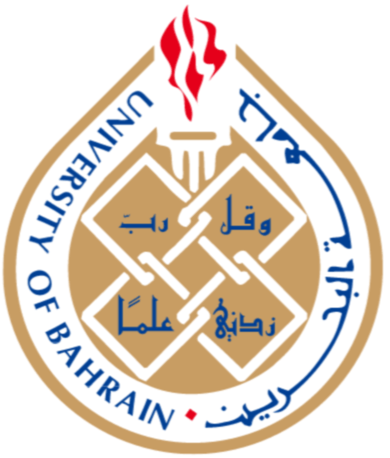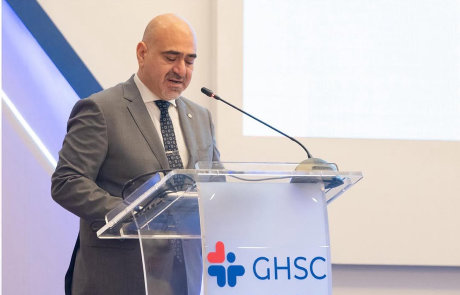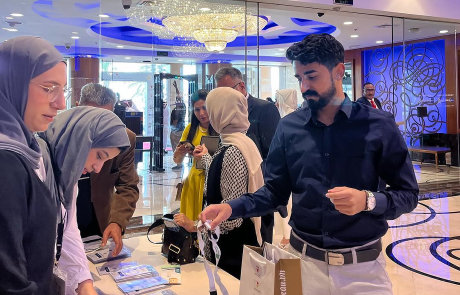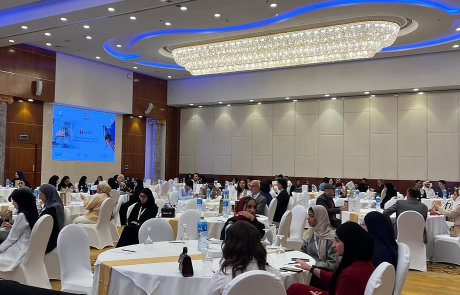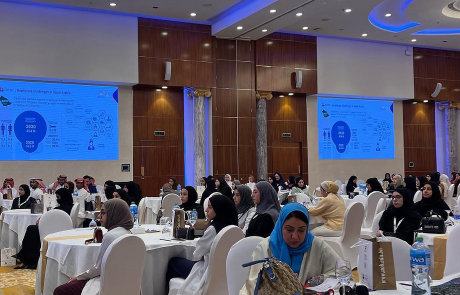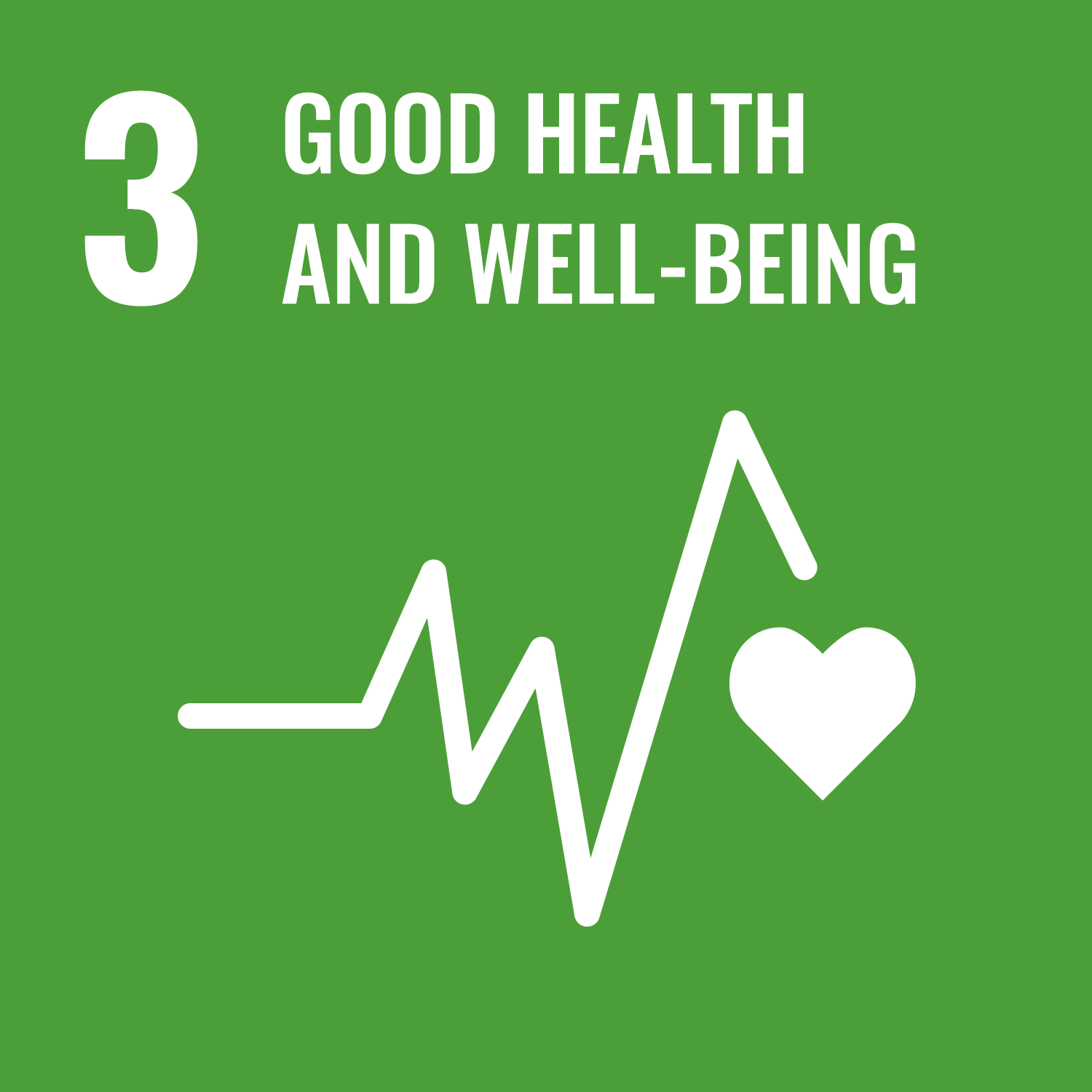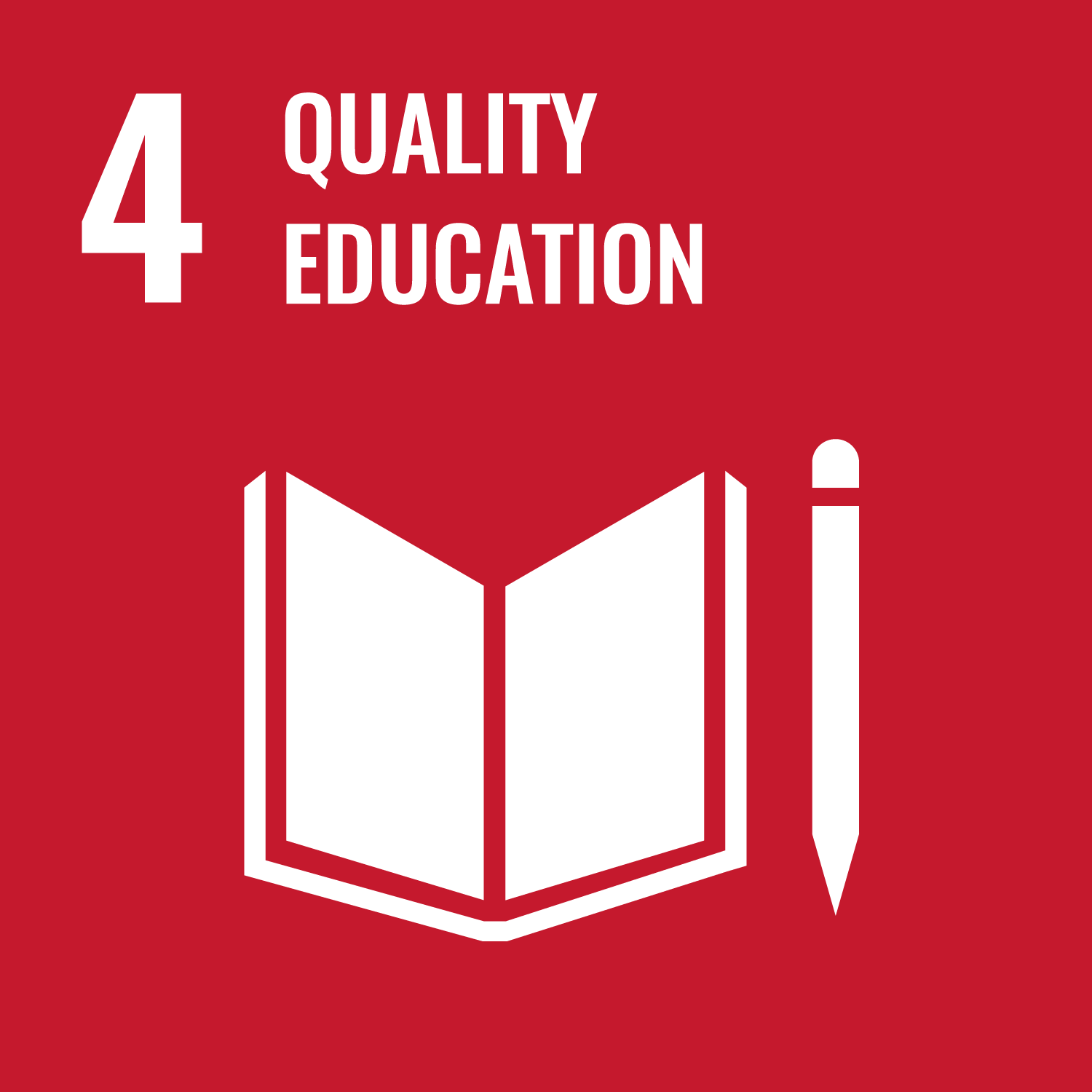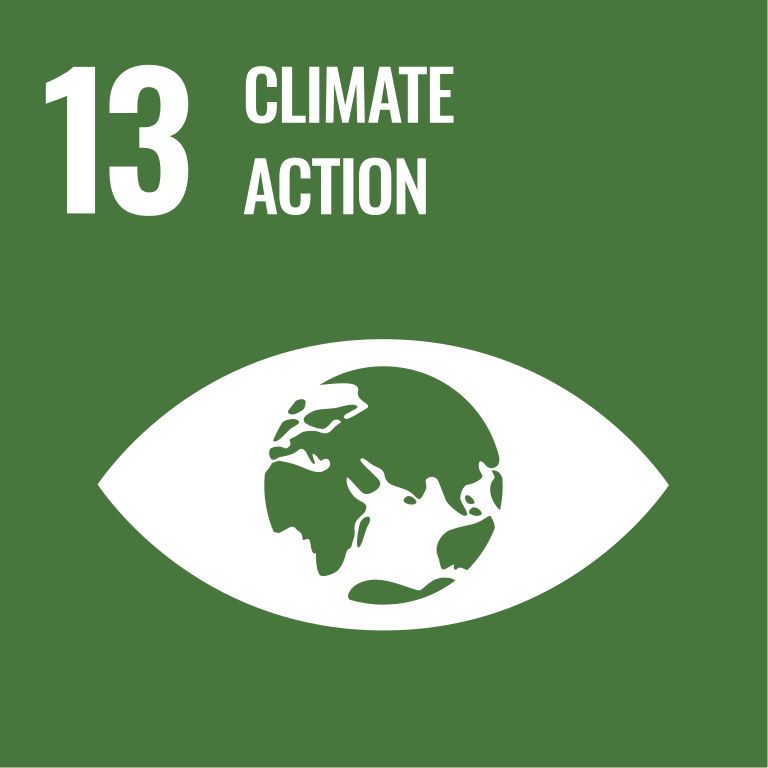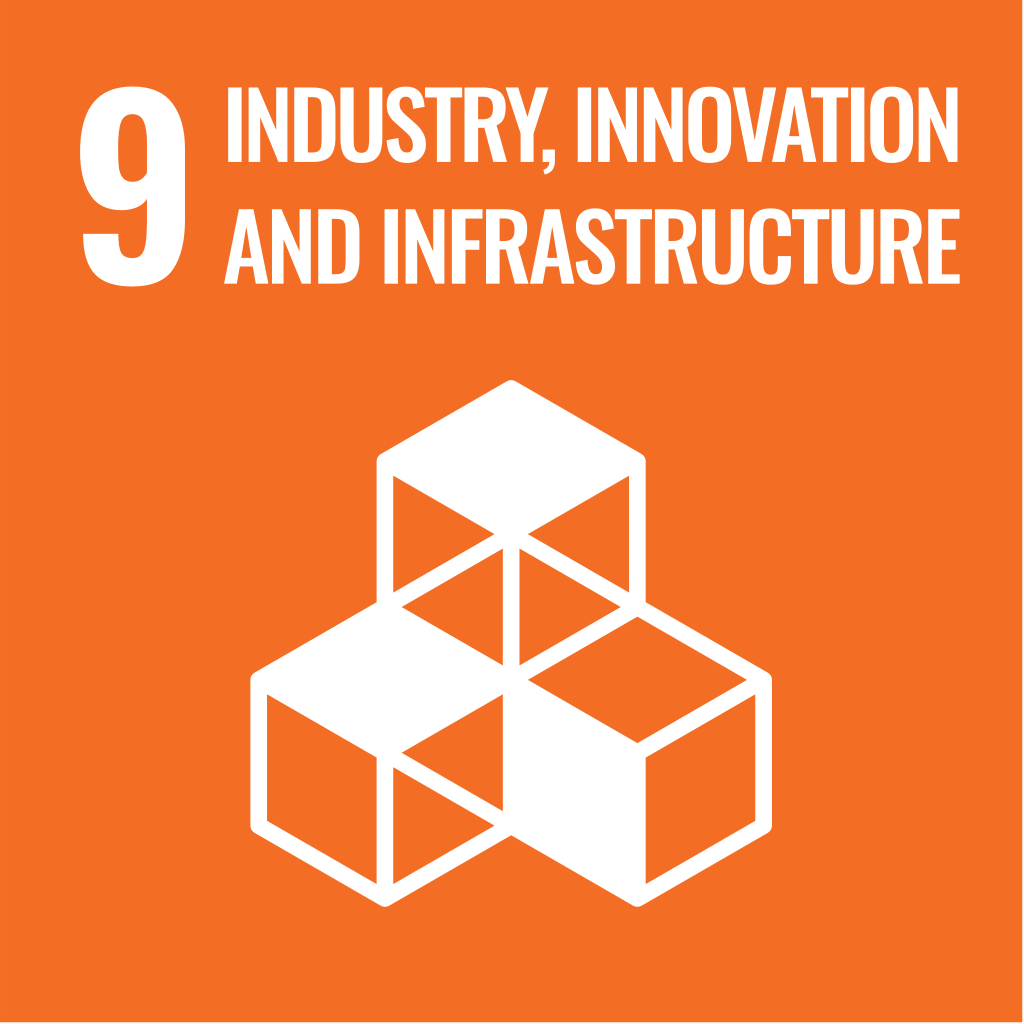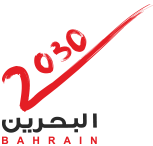Engagement (Community and Industry)
SDG 3: Focus Areas
3.3.2 Health outreach programs
Does your university as a body deliver outreach programmes and projects in the local community (which can include student volunteering programmes) to improve or promote health & wellbeing including hygiene, nutrition, family planning, sports, exercise, aging well, and other health and wellbeing related topics?
As:
– Disadvantaged people,
– Local communities,
– Refugee or immigrant communities.
The University of Bahrain (UOB) demonstrates a sustained institutional commitment to advancing public health and well-being through comprehensive community outreach programmes delivered across the Kingdom. These initiatives extend beyond campus boundaries and are designed to meet the health needs of local communities, disadvantaged groups, and diverse populations, including refugee and immigrant communities who routinely benefit from UOB’s open-access activities held in public spaces.
UOB’s health outreach model is built on wide-reaching engagement, preventive education, early detection, and empowerment. Through medical screenings, awareness campaigns, mental health sessions, sports and fitness activities, nutritional guidance, and anti-smoking initiatives, the University directly contributes to improving community well-being. Activities are delivered in malls, public parks, elderly care centers, community clubs, and national events, ensuring that programmes remain accessible to all socio-economic groups, including individuals with limited healthcare access.
A significant number of initiatives are led or supported by UOB students and faculty volunteers, strengthening both the reach and sustainability of the University’s community impact. Programmes addressing chronic diseases, women’s health, elderly well-being, youth obesity, mental health, and public safety are designed to support segments of society that face heightened vulnerability or barriers to reliable health services.
Events hosted in public venues—such as Bahrain National Stadium, City Centre, local malls, and community organizations—naturally engage the Kingdom’s multinational population, which includes expatriate workers, immigrant communities, and refugees residing in Bahrain. These open and inclusive outreach activities ensure that UOB’s health initiatives contribute to the well-being of all residents, regardless of nationality or background.
Through its collaborative approach with government entities, NGOs, health institutions, and international partners, the University of Bahrain ensures that its outreach programmes effectively respond to community needs and advance national priorities aligned with Sustainable Development Goal 3: Good Health and Well-Being. The breadth, inclusiveness, and public accessibility of these initiatives position UOB as a leading contributor to health promotion and disease prevention in Bahrain.
1st Gulf Healthcare and Sports Congress
Promoting Innovation and Collaboration in Health and Sports
The University of Bahrain hosted the 1st Gulf Healthcare and Sports Congress, a pioneering regional platform that brought together experts, researchers, and practitioners to discuss transformation in healthcare, sports science, and leadership within the Gulf region’s health ecosystem.
The Congress addressed emerging topics such as artificial intelligence in healthcare, sports medicine, nursing leadership, and well-being innovation, fostering interdisciplinary dialogue and collaborative research across health and sports domains. Participants included representatives from government entities, universities, and private healthcare institutions, emphasizing the integration of science, policy, and practice for improved community health outcomes.
Related Links:
Relevant SDG 3 Targets and Indicators:

Health-Related Outreach: University of Bahrain and IET (UK) Collaboration for GCC Robotics Challenge on Medical Innovation
Description:
The University of Bahrain (UOB), in collaboration with the Institution of Engineering and Technology (IET–UK), co-organized the GCC Robotics Challenge in November 2024, focusing on robotics-based healthcare solutions. This regional initiative brought together students, academics, and professionals from across the GCC to design and develop innovative robotic systems addressing real-world medical and healthcare challenges.
Evidence of Activity:
UOB supported the event through co-organization, judging, and technical mentoring, providing participants with guidance in areas such as medical robotics, rehabilitation devices, and AI-assisted healthcare technologies. The initiative encouraged interdisciplinary collaboration between engineering, computer science, and health sciences, fostering creativity and problem-solving in support of healthcare innovation.
Impact and Outcome:
The challenge served as a health-related outreach program, raising awareness of how emerging technologies can improve healthcare delivery, patient outcomes, and accessibility. It enhanced capacity building and knowledge exchange among academic and professional communities, promoting research-driven learning and technology transfer. Through this collaboration, UOB contributed to advancing SDG 3 (Good Health and Well-being) and SDG 17 (Partnerships for the Goals) by integrating innovation, education, and sustainability into regional healthcare development.
Key Highlights:
- Co-organized the GCC Robotics Challenge with IET (UK).
- Focused on robotics-based healthcare and medical innovation.
- Supported by UOB’s technical mentoring, judging, and event coordination.
- Promoted capacity building in healthcare technology and engineering.
- Advanced SDG 3 (Health and Well-being) and SDG 17 (Partnerships for the Goals).
Evidence:
Relevant SDG 3 Targets and Indicators:
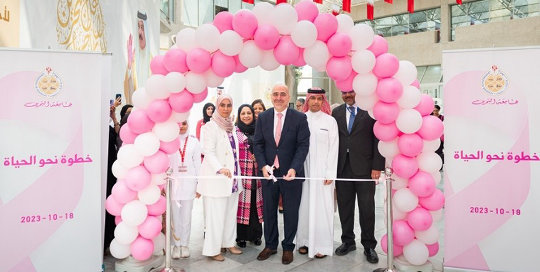
Breast Cancer Awareness Campaigns: A Step Towards Life
Overview
Each October, the University of Bahrain leads nationwide Breast Cancer Awareness Campaigns to promote early detection, prevention, and women’s health empowerment. Organized across campuses, healthcare centers, schools, and public spaces, the campaigns include educational lectures, workshops, and outreach activities. These efforts aim to increase knowledge about risk factors, screening methods, and the importance of adopting healthy lifestyles to reduce breast cancer risks.
Impact
The initiative strengthens community awareness and encourages proactive health behavior among women and youth. By fostering preventive health education and promoting early screening, the campaign directly supports SDG 3.4.1, which seeks to reduce premature mortality from non-communicable diseases through prevention, treatment, and awareness.
Evidence: UOB News Press
Relevant SDG 3 Targets and Indicators:
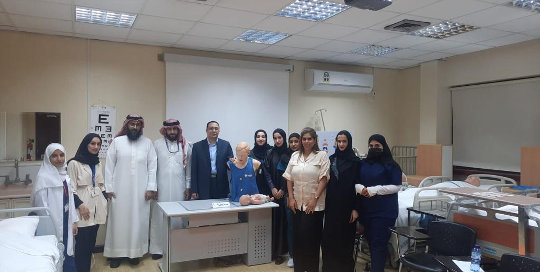
Safety and First Aid – Safe University Life Workshops
Overview
The University of Bahrain reinforces health and safety awareness through the Safe University Life – First Aid Workshops, organized by the International Training Center at the Department of Nursing, College of Health and Sports Sciences. The initiative promotes a culture of safety and preparedness among students and staff.
Impact
The workshops, led by nursing faculty, provided hands-on training in first aid and emergency response through demonstrations and simulations. Participants gained vital skills to manage health emergencies and support community well-being. This initiative contributs to improved health awareness, prevention, and responsiveness within the university community.
Relevant SDG 3 Targets and Indicators:
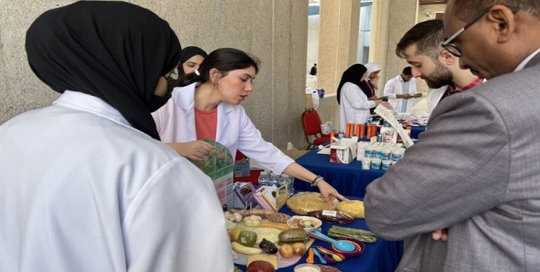
Gulf Nutrition Week”: How to Prepare Healthy Meals for Work?
Overview
The University of Bahrain (UoB), through the College of Health and Sport Sciences (CHSS), organized Gulf Nutrition Week under the theme “How to Prepare Healthy Meals for Work?” to promote nutritional awareness and healthy lifestyles among students and staff.
The event brought together CHSS students, university departments, and specialists from the Ministry of Health to educate participants on balanced nutrition, healthy cooking, and physical fitness. Activities included workshops, lectures, fitness challenges, and interactive competitions focused on improving daily eating habits and fostering well-being on campus.
Impact
The initiative successfully strengthened UoB’s commitment to SDG 3 (Good Health and Well-being) by promoting evidence-based nutrition education, preventive health awareness, and physical activity across the university community.
Participants gained practical skills such as reading food labels, identifying healthy fats, and preparing nutritious meals for work and study. Engaging campaigns and walking activities encouraged students and staff to adopt sustainable health habits—advancing UoB’s role as a Health Promoting University and supporting Bahrain’s public health objectives.
Evidence:
News Press – UoB Gulf Nutrition Week
Instagram Reel – Event Highlights
Relevant SDG 3 Targets and Indicators:
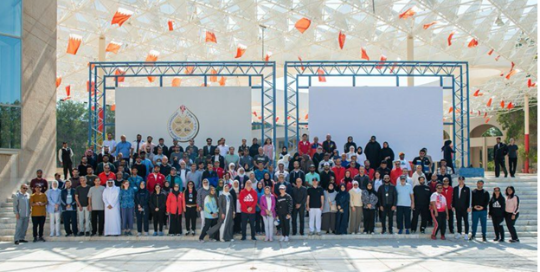
Bahrain Sports Day: Promoting Active Lifestyles and Community Well-being
Overview
The Bahrain Sports Day is an annual national celebration organized by the Department of Physical Education at the University of Bahrain (UoB), dedicated to promoting physical fitness, teamwork, and a culture of health and vitality.
The event engages students, faculty, and staff in a wide range of sporting and recreational activities, including fitness challenges, team sports, and wellness workshops. It fosters inclusive participation across all fitness levels, emphasizing the importance of regular exercise as part of a balanced, healthy lifestyle.
Impact
Bahrain Sports Day strengthens UoB’s role in supporting SDG 3 (Good Health and Well-being) by promoting preventive health behaviors, reducing sedentary habits, and building community spirit through shared physical activity.
The initiative contributes to improved physical and mental well-being, enhances social interaction, and reinforces the university’s commitment to holistic health education.
By integrating fitness and wellness into campus life, the University of Bahrain empowers its community to maintain long-term healthy lifestyles and supports national health objectives in alignment with the Health Promoting Universities program.
Evidence: UoB News Press
Relevant SDG 3 Targets and Indicators:
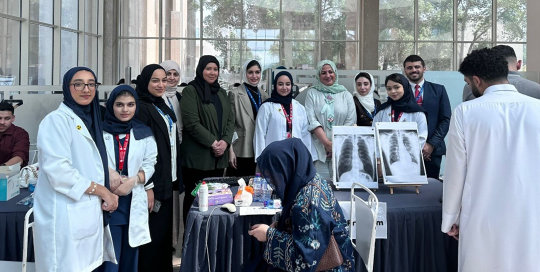
Together Against Smoking : Promoting a Smoke-Free University Community
Overview
The “Together Against Smoking” initiative at the University of Bahrain (UoB) was a comprehensive awareness campaign designed to educate students and the broader community about the dangers of smoking and the benefits of leading a smoke-free life.
Through educational sessions, workshops, and health-focused activities, participants learned about the physical and psychological effects of smoking, its connection to chronic diseases, and the importance of prevention and early intervention.
Impact
In collaboration with health professionals and national health organizations, the initiative provided practical tools and support for those seeking to quit smoking, including: counseling, cessation programs, and informational materials that empowered individuals to make healthier choices.
By fostering a supportive environment and encouraging peer engagement, Together Against Smoking successfully strengthened the culture of wellness on campus and promoted long-term behavior change.
This initiative directly supports Sustainable Development Goal 3 (Good Health and Well-being) by advancing public health awareness, reducing smoking rates, and promoting a healthy, smoke-free generation.
Relevant SDG 3 Targets and Indicators:
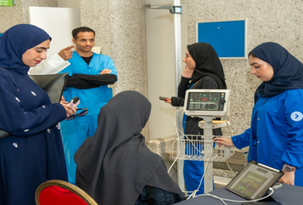
Weight Loss Awareness: Promoting Healthy Lifestyles and Preventing Obesity
Overview
The Weight Loss Awareness Campaign, organized by the University of Bahrain (UoB) in collaboration with the Arabian Gulf University, tackled the growing concern of obesity among youth through education, early screening, and personalized support.
The initiative aimed to promote balanced nutrition, physical activity, and long-term lifestyle changes that reduce the risk of obesity-related diseases. Students and health specialists conducted on-campus screenings, including blood pressure and blood sugar checks, helping participants identify potential health issues early.
Impact
The campaign combined health education and preventive action, offering individualized counseling on nutrition, exercise, and weight management strategies.
By empowering students to take ownership of their health and sharing real success stories from peers, the initiative created a ripple effect of motivation and awareness across campus.
Through these efforts, UoB demonstrated its commitment to SDG 3 (Good Health and Well-being) by promoting healthy habits, preventive healthcare, and community-wide engagement in wellness practices.
Relevant SDG 3 Targets and Indicators:
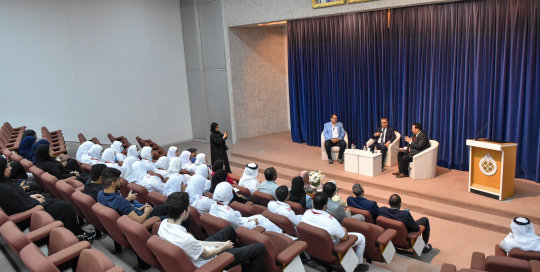
“Movember” Men’s Health Awareness Month – Men’s Health, A Healthy World
Overview
The College of Health and Sport Sciences (CHSS) at the University of Bahrain (UoB) organized the “Movember” Men’s Health Awareness Month under the theme “Men’s Health, A Healthy World.”
This initiative focused on raising awareness about health issues that predominantly affect men, such as heart disease, prostate cancer, and mental health challenges. Through expert-led discussions, wellness sessions, and awareness activities, participants were encouraged to prioritize preventive care, adopt healthier lifestyles, and seek regular medical checkups.
Impact
The campaign highlighted the equal importance of mental and physical well-being, helping to create an open environment where men could comfortably discuss health concerns.
By integrating education, dialogue, and preventive action, Movember fostered a campus culture of responsibility toward men’s health and well-being.
This initiative directly contributes to SDG 3 (Good Health and Well-being) by promoting early detection, awareness, and behavioral change that support long-term, sustainable health outcomes for men across the community.
Relevant SDG 3 Targets and Indicators:
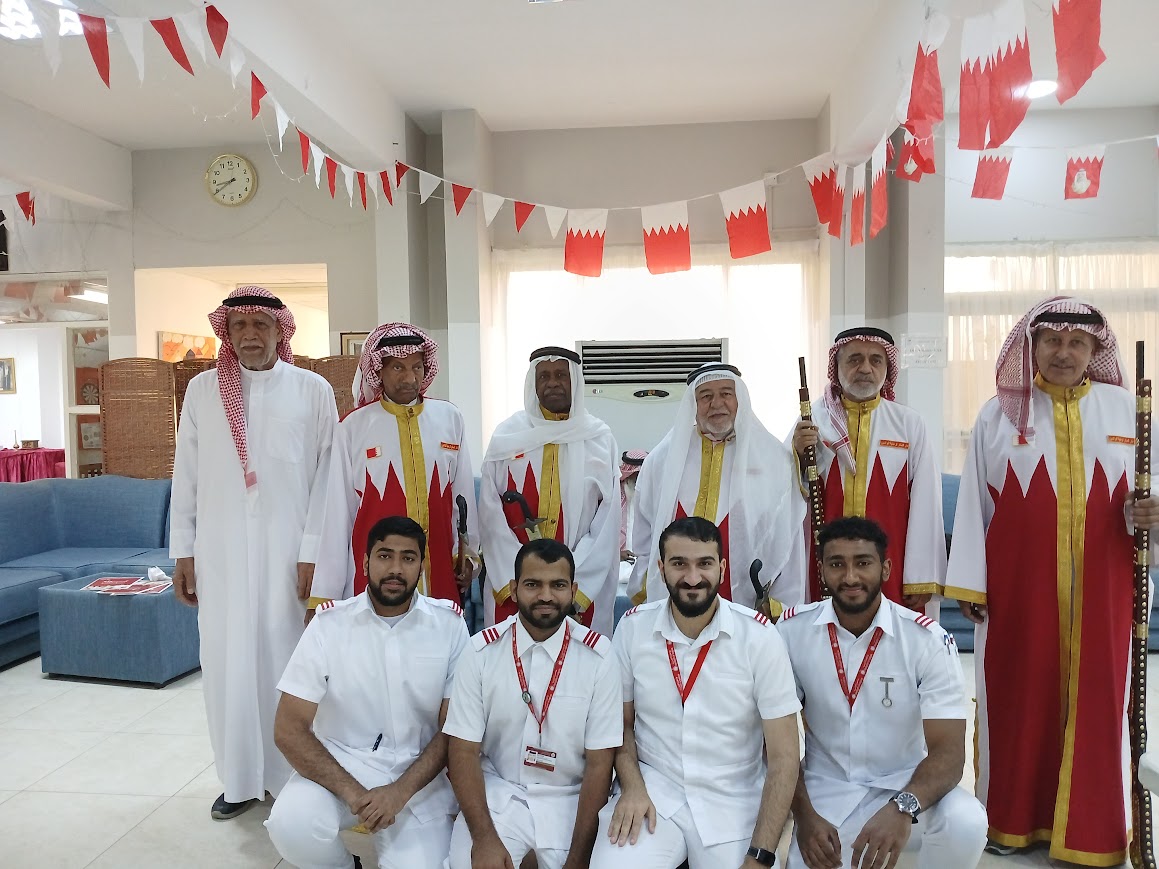
UoB Participation in the Capital Friendly to the Elderly Campaign
Overview
The University of Bahrain (UoB) took part in the “Capital Friendly to the Elderly” campaign, organized by the Governorate of the Capital at Sitra Mall, marking the International Day for Older Persons.
Students from the College of Health and Sport Sciences (CHSS) played an active role in promoting elderly well-being through health screenings, including blood pressure and blood sugar measurements, and guided exercise sessions tailored to address common mobility and joint concerns among seniors.
Impact
The initiative also offered mental health consultations and counseling to help older adults maintain confidence, cope with age-related changes, and strengthen their sense of inclusion within society.
By combining preventive healthcare, physical activity, and emotional support, the program reflected UoB’s dedication to community well-being and the promotion of healthy aging.
This engagement directly contributes to SDG 3 (Good Health and Well-being) by supporting preventive health practices, promoting inclusivity, and enhancing the quality of life for Bahrain’s senior citizens.
Relevant SDG 3 Targets and Indicators:
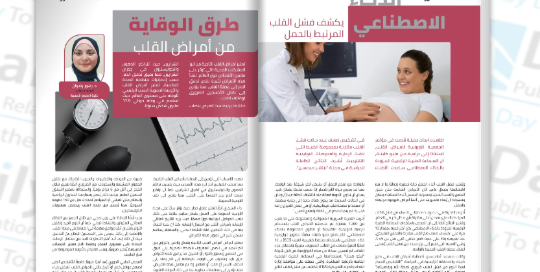
Public Health Education and Media Outreach
Overview
The College of Health and Sport Sciences (CHSS) at the University of Bahrain (UoB) plays a leading role in advancing public health awareness through expert-led lectures, community forums, and online discussions.
These sessions focus on key health issues such as preventive care, chronic disease management, mental health, and nutrition, providing accessible, evidence-based education to the Bahraini public.
UoB faculty also collaborate with national newspapers, radio, and television to publish expert columns and media features, ensuring that reliable and research-informed health information reaches a wide audience. By 2030, the University aims to reach over 100,000 citizens through public lectures, campaigns, and media outreach.
Impact
Through these efforts, the University promotes informed decision-making, healthier lifestyles, and stronger community resilience. By transforming scientific expertise into public understanding, CHSS strengthens national health literacy and supports Bahrain’s sustainable development priorities.
Related Links:
Relevant SDG 3 Targets and Indicators:
Community Services and Volunteer Engagement
Overview
Faculty and staff at the University of Bahrain actively contribute to national health promotion through participation in non-profit organizations such as the Bahrain Red Crescent Society, Anti-Smoking Society, Sickle Cell Disease Association, Bahrain Diabetes Society, and Bahrain Cancer Society. Their volunteer efforts focus on raising awareness, supporting health programs, and providing education to improve community well-being.
Impact
Through sustained engagement in public health campaigns and volunteer initiatives, the university community supports disease prevention, promotes healthy lifestyles, and strengthens care for vulnerable populations. These efforts directly advance SDG 3.3 by addressing communicable diseases and health risks, and SDG 3.4 by reducing non-communicable diseases and promoting mental health and well-being across Bahrain.
Relevant SDG 3 Targets and Indicators:

Baby-Friendly Hospital Initiative (BFHI) – Health Outreach Program
Overview:
Representatives of nursing faculty members have been selected to be among the assessors for the WHO's Baby-Friendly Hospital Initiative for promoting optimal infant feeding practices and maternal care. This initiative aims to ensure that hospitals create a supportive environment for breastfeeding and mother-baby bonding. They play a crucial role in developing and delivering training programs for healthcare professionals, educating them on the Ten Steps to Successful Breastfeeding. Through their expertise in evidence-based practice, nursing faculty conduct research that informs hospital policies and enhances care quality for mothers and infants. Additionally, they engage in community outreach to raise awareness about the benefits of breastfeeding, dispelling myths, and fostering supportive environments. As mentors, they instil values of compassionate care in nursing students, ensuring future leaders uphold BFHI principles. By collaborating with multidisciplinary healthcare teams, nursing faculty integrate BFHI practices into hospital protocols, and their commitment to continuous improvement ensures adherence to high standards of care. Ultimately, their efforts significantly contribute to the health and well-being of families and communities, making breastfeeding a priority in maternal and infant health.
Impact:
Through outreach, training, and awareness campaigns, UoB strengthens maternal and child health across hospitals and communities in Bahrain. These efforts support SDG 3.3.2, advancing health education, preventive care, and improved well-being for mothers and infants.
Evidence: Event link
Relevant SDG 3 Targets and Indicators:
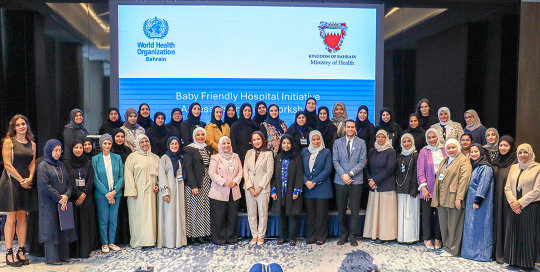
Public Breast Cancer Awareness Campaign
Overview:
The University of Bahrain, in collaboration with the World Health Organization (WHO), organized a Public Breast Cancer Awareness Campaign at one of Bahrain’s major shopping malls. The event featured nine interactive stations designed to educate the public on early screening and diagnosis. Over 300 community participants engaged in awareness activities, including a solidarity board where attendees added pink ribbons and motivational messages to show support for those affected by breast cancer. Educational materials on breast health, risk factors, and regular screening were distributed to all participants.
Source 1 | Source 2
Impact:
The campaign enhanced public knowledge about breast cancer prevention and early detection, encouraged community engagement in health promotion, and fostered a supportive environment for women’s health. Through collaboration with WHO and direct community outreach, the initiative advanced SDG 3.3.2, strengthening awareness, empowerment, and preventive healthcare practices in Bahrain.
Relevant SDG 3 Targets and Indicators:
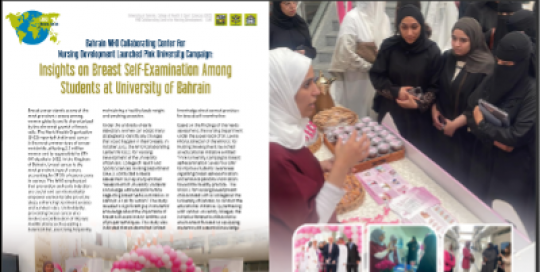
WHO AWaRe Antibiotic Resistance Workshop (for Prescribers)
Overview
The University of Bahrain, in collaboration with the World Health Organization (WHO), organized the AWaRe Antibiotics Workshop to raise awareness among doctors about Antimicrobial Resistance (AMR) and promote responsible antibiotic use. The workshop focused on the WHO AWaRe classification — Access, Watch, and Reserve — guiding rational prescribing based on drug effectiveness and resistance potential. Participants reviewed global and local AMR data and engaged in interactive, case-based sessions applying the AWaRe framework to real clinical scenarios.
Impact
The workshop strengthened antibiotic stewardship and improved prescribers’ understanding of evidence-based antibiotic use, infection prevention, and patient education. It fostered collaboration among healthcare professionals to establish consistent prescribing practices, directly supporting SDG 3.3.2 (Health Outreach Programs) by advancing community health protection and contributing to WHO’s global strategy against antimicrobial resistance.
Evidence: University Instagram Post
Relevant SDG 3 Targets and Indicators:
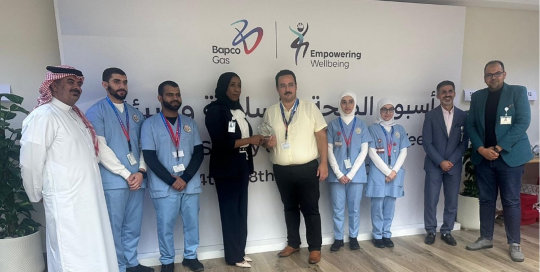
Occupational Health, Safety, and Environment (HSE): AI Innovation in Workplace Safety
Overview
Students from the Department of Nursing at the CHSS demonstrated exceptional innovation by winning the Best University-Level Presentation Award during the Health, Safety, and Environment (HSE) Week organized by Bapco Gas Company at its Sakhir headquarters from November 24 to 28, 2024. The students presented an innovative proposal for an electronic application titled “SANAD”, designed to promote health and safety among workers across various occupational settings through the integration of artificial intelligence (AI) technologies. The application aims to monitor workers’ physical well-being, detect potential health risks, and provide early alerts and safety recommendations, contributing to safer and healthier workplaces. This initiative reflects the University’s commitment to encouraging students to apply scientific knowledge and technological innovation to real-world challenges. The students’ project showcased the integration of nursing expertise with digital health innovation, highlighting the vital role of nurses in advancing occupational health and safety through technology. The recognition by Bapco Gas Company underscores the University of Bahrain’s dedication to fostering creativity, interdisciplinary learning, and community collaboration. It also emphasizes the importance of empowering future nurses to contribute to sustainable development goals related to health, safety, and technological advancement in the workforce.
Impact
The “SANAD” project demonstrates the University’s practical contribution to community health and occupational safety. By merging nursing knowledge with digital innovation, it enhances prevention strategies for workplace injuries and illnesses, and Health risk preparedness. Recognition from Bapco highlights UoB’s success in integrating academic learning, research, and societal impact.
Read more
Relevant SDG 3 Targets and Indicators:

Multiple Sclerosis Awareness Event
Overview
The Multiple Sclerosis (MS) Awareness Event reflects the University of Bahrain’s enduring commitment to promoting chronic disease awareness and community health education. Organized in collaboration with the Department of Neurosciences, the event features a comprehensive program that includes scientific lectures on the causes, symptoms, and treatment of MS, interactive activities to engage participants, and personal testimonials from students living with the condition.
This initiative enhances students’ understanding of neurological disorders and highlights the importance of early diagnosis, adherence to treatment, and psychosocial support in managing MS. By combining education with lived experiences, the event fosters empathy, inclusion, and compassion, creating a supportive campus environment for individuals affected by chronic illnesses. In addition, informational booths and resource stations provide attendees with evidence-based materials, contact information for local support networks, and guidance on maintaining neurological health.
Impact
This addresses the non-communicable diseases through prevention and awareness. It enhances health literacy, encourages early diagnosis, and builds an empathetic and inclusive learning environment for individuals living with MS. By integrating education, community participation, and advocacy, the University of Bahrain strengthens community resilience and public understanding of chronic neurological conditions.
Relevant SDG 3 Targets and Indicators:
Participation in the Advancing Preventive Health and Genomic Awareness
Overview
The College of Health and Sport Sciences (CHSS) actively contributes to Bahrain’s National Genome Program, promoting awareness of genomics and preventive health. Since 2019, Medical Laboratory Sciences (MLS) students have participated in national outreach, conducting community education sessions and assisting with blood sample collection for genomic testing. During the COVID-19 pandemic, MLS students further supported the Ministry of Health’s Public Health Department, contributing directly to public health efforts.
Impact
This initiative strengthens national capacity in health research and innovation while enhancing preventive healthcare awareness. Several MLS students were later hired full-time by the Ministry of Health, underscoring the University’s role in workforce development.
Relevant SDG 3 Targets and Indicators:
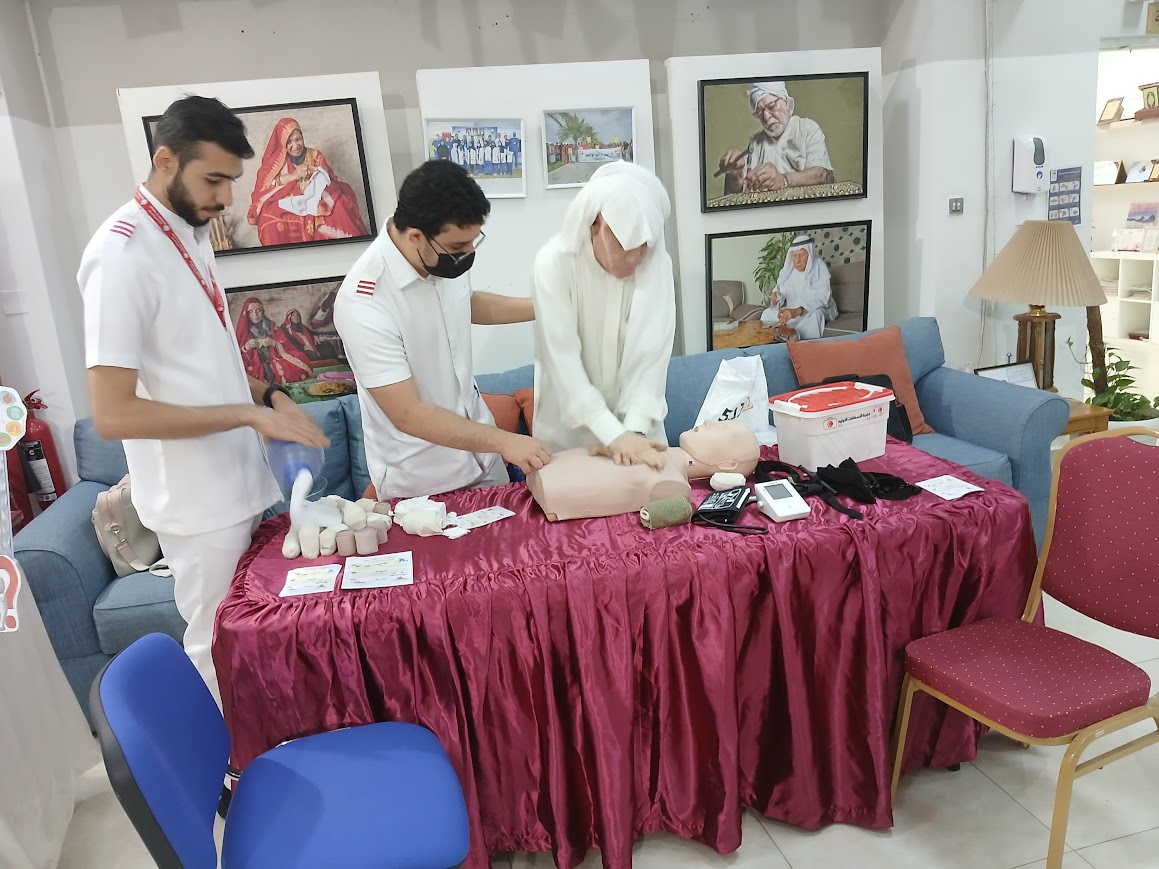
Creative Activities Empowering Older Adults at Day Care Centers
In an innovative initiative, nursing students at local day care centers are enhancing the cognitive and psychomotor abilities of older adults through creative activities. These hands-on projects, designed and executed by students, aim to boost the seniors' sense of well-being. Each creative endeavor is meticulously planned, requiring faculty approval and strict adherence to safety measures. After a brief five-minute session, the participants showcase their artistic expressions, fostering engagement and reflection. This initiative not only empowers the elderly but also enriches students' learning experiences in health promotion.
